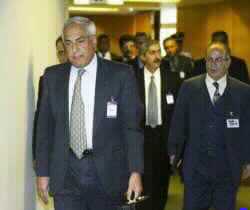HIGHLIGHTS: U.S. Intensifies Lobbying Support for a New Tough U.N. Resolution on Iraq at the U.N. Security Council||Russia, France & China Strongly Resist Anglo-American Efforts at the U.N. Security Council with Moscow Accusing Washington of Timing an Air Raid against Iraq to Coincide with Vienna Talks||Domestic Opposition to War Growing Both in the U.S. & U.K.|| IAEA Says Baghdad Doing its Best to Accommodate the 'anyplace unfettered access' Requirements||Proposed Anglo-American U.N. Draft Resolution Text Would Allow U.S. to Decide by itself When Iraq Has Violated Provisions in the Resolution without Awaiting for Word from the Arms Inspectors||U.S. Experts Estimate Cost of War against Iraq Would Range from dlrs 6-9 Billion a Day|| STORY: U.N.-Iraq talks on the return of arms inspectors to Iraq made progress on Monday but could not dispel the looming possibility of a U.S.-led war to destroy any weapons of mass destruction harbored by Baghdad.
Mohamed ElBaradei, head of the International Atomic Energy Agency which is hosting the meeting, gave a guardedly optimistic assessment of the first day of talks between Chief U.N. weapons inspector Hans Blix and Iraqi arms experts in Vienna.
ElBaradei added, "I think we are making progress, but we still have a lot of work to do ... We are trying to restore as much of the anytime, anyplace and unfettered access as possible."
The Vienna talks are the first test of Iraq's cooperation since Baghdad agreed on Sept. 16 to the unconditional return of the inspectors under threat of a U.S. military strike.
"I think it's a quite businesslike atmosphere. I think they are trying their best to move forward, to accommodate our requirements," ElBaradei said.
General Amir al-Saadi, a technical adviser to Saddam, agreed the talks were businesslike but declined to give further details.
But at U.N. headquarters in New York, the United States intensified lobbying of the 10 rotating U.N. Security Council members in support of a resolution that would allow Washington to strike Iraq if it perceived violations.
Most Security Council members have reservations about a text that would allow the United States to decide by itself when Iraq has violated provisions in the resolution without awaiting for word from the arms inspectors.
OPPOSITION BOTH ABROAD AND AT HOME
Bush has the enthusiastic support of British Prime Minister Tony Blair in his anti-Saddam campaign but is facing strong resistance from two other veto-holding permanent members of the Security Council, France and Russia.
China, the other permanent member of the Security Council, remained skeptical of the proposed U.S. resolution, repeating its wish for a political solution after a British envoy handed the draft to officials in Beijing.
In Moscow, the Russian foreign ministry suggested that the most recent U.S. and British air raids in the no-fly zones over Iraq had been timed to coincide with the opening of the Vienna talks.
White House spokesman Ari Fleischer rejected the charge, saying Iraq's "actions are defiance of international law, international rule, of military attacks on coalition aircraft."
Bush also faces opposition at home in Washington, where prominent Democratic and Republican senators warned the White House on Monday they wanted a central role for the United Nations in any attack on Iraq.
Congressional budget analysts on Monday estimated the cost of fighting a war with Iraq at between dlrs 6 billion and dlrs 9 billion a month, with preparing for a conflict and winding down after it adding another dlrs14 billion to dlrs 20 billion to the total.
It is the latest in a series of war cost estimates, some ranging as high as dlrs 200 billion, which have garnered attention on Capitol Hill in light of growing U.S. budget woes.
PHOTO CAPTION
Head of the Iraqi delegation Amir Al Sadi, left, arrives for the afternoon session of the negotiations between representatives of the United Nations, the International Atomic Energy Agency (IAEA) and from Iraq about the return of U.N. weapon inspectors to Iraq, on Monday, Sept. 30, 2002 at the IAEA's headquarters in Vienna. (AP Photo/Rudi Blah
- Author:
& News Agencies - Section:
WORLD HEADLINES


 Home
Home Discover Islam
Discover Islam Quran Recitations
Quran Recitations Lectures
Lectures
 Fatwa
Fatwa Articles
Articles Fiqh
Fiqh E-Books
E-Books Boys & Girls
Boys & Girls  Articles
Articles










